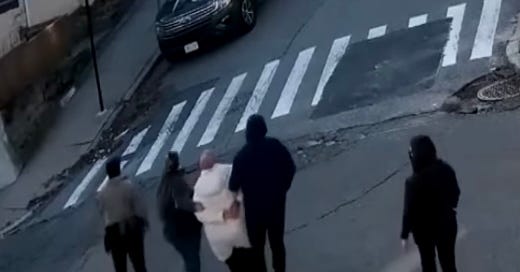An unmarked black car slides up along the sidewalk, windows darkened. The engine purrs.
Your heart beats. You must look calm. You are a writer. You write about freedom. You speak up about justice. And you’ve heard of arrests. Have they come for you this time?
Keep walking. Walk calmly. Swing your shopping bag, with the leafy vegetables poking out on top, and the tulip buds. Walk, sing a song for the beautiful day. Turn a corner; don't look over your shoulder.
The engine's whisper grows faint. Perhaps the car has moved on? Perhaps those dark windows were not spying on you, after all? Breathe.
From the corner, you look back now; you sneak a peak. Three men in dark clothes stand near the car, wearing black masks. They surround a young man in red sneakers, with a computer bag slung over his shoulder. He has longish black hair, and olive skin. He speaks up, loudly; his hands punctuate the sudden hush that has fallen over the street. Passers-by stand frozen. A woman reaches out her hand, calls out a name. A fourth man emerges from the car and takes a step in her direction; she moves back behind the cluster of others.
You watch from where you stand, ready to run. Nobody has noticed you. Suddenly, you see handcuffs. The men force the student forward, twist his arms behind him. The back door of the car slides open; the young man disappears; the door slams shut. The masked men get in, the purring engine grows louder, and the car slides down the avenue. You walk on, trying to breathe. You can't see where you're going. It does not matter. You're still free. For how long?
What will we choose? Freedom? Or speech? For our sisters and brothers who are less white, or less well connected, the choice is riskier.
Yet, I must speak, even if any day, the dark car might come and find me, or any one of us.
.




“Then they came for me—and there was no one to speak for me.” Raymond Niemoller, pastor during the holocaust.
Powerful. Thank you.